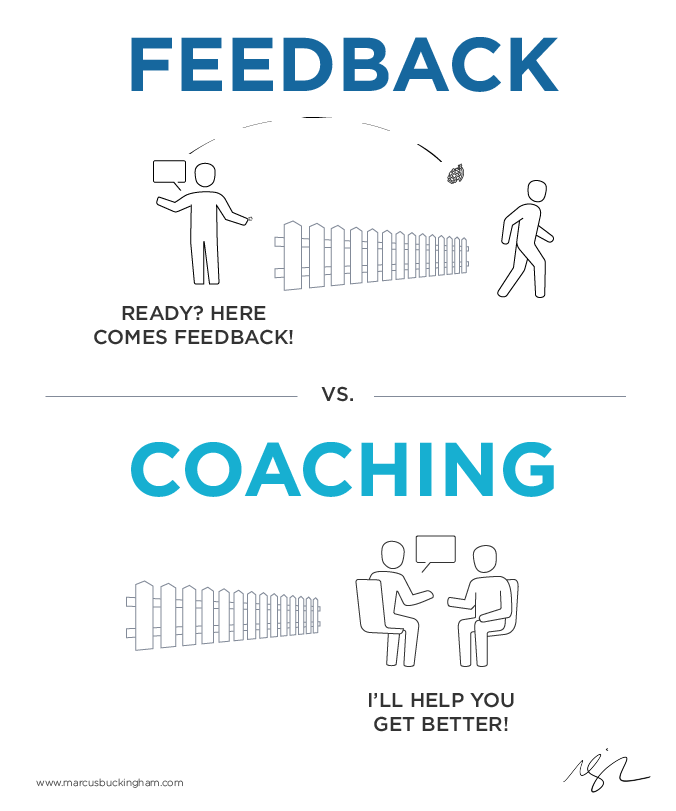Coaching vs. Feedback
Feedback has become completely integrated into all aspects of our lives. We go to a restaurant and give feedback after our meal. We take a class and give feedback for our teacher. We can even attend meetings and give feedback on how the meeting went. And of course, we give feedback on our how our managers are leading and how our team members are performing.
So what’s the problem? Well, it turns out that people don’t like feedback. When someone turns to you and says “I am going to give you some feedback right now,” your brain certainly doesn’t react with openness and enthusiasm. Your brain reacts with stress. People don’t want feedback; they want attention.People don't want feedback; they want attention. Share on X
The world of work is no different; team members are not looking for feedback from their team leaders, they’re looking for attention. And yes, that attention can and should be focused on how to help the team member get better – but that’s a far cry from feedback. That’s coaching.
Imagine that your employee, the team member, is standing on one side of a fence. The difference between feedback and coaching lies on what side of the fence you, the team leader, are on. If you’re giving them feedback, it’s like standing on the opposite side of the fence, throwing a grenade over it, and covering your ears and running away after the damage is done. Hey, you’ve given them their feedback, now it’s their job to perform better, right?
Wrong.
Team members don’t want that. No one wants that. We all want the team leader to come to our side of the fence, look at the world from where we’re standing, and tell us how to adjust from where we are to get better.
If you’re going to give feedback, it has to come from a place of coaching. Nobody wants feedback, but everyone would appreciate being coached on how to course-correct to perform better. And maybe you want to give feedback, but you will never get the outcomes from it that you’re looking for. Unless, of course, making your team member defensive is your desired outcome.
Your employees aren’t asking you to tell them where they stand. They’re asking you to tell them how to get better.
Clip courtesy of the 2017 Global Leadership Summit.
5 Comments
Comments are closed.


I really enjoy watching these short videos and totally support the philosophy behind them. It would be great to also have an example of information given in a feedback vs coaching context to really drive the message home. Thanks Marcus!
Coaching is the better and more engaging way to success. In part, because it is about relationships that are effective.
Nice and informative post. Feedback is very important process after any any service.
[Little late to the game on this.] Okay, so…feedback is only useful if delivered in a coaching context. I am struggling with that statement—and potentially the premise in your POV—because I feel like we are dismissing feedback simply because “people don’t like it.” This is a bad reason to dismiss something.
Why not look at the problem/solution through a different set of criteria? Don’t look at it through the lens of what people like. Look at it through the lens of why might they have an aversion to feedback (brain science tells us why)—and how do we help them to better receive it.
Also, it sounds like you are making this a problem that rests solely on the feedback giver (hence, you seem to be making the case for coaching and giving “attention”). But there are two people involved in the interaction: the team leader and the team member. Responsibility rests on both people in the interaction. So, yes, focus on how to best give feedback. And emphasize the need to develop the skills and smarts to receive feedback well. Our brains don’t like feedback. True (and our brains don’t like a lot of other things). But a better solution is to encourage the work of each individual to extract the learning that can come from receiving feedback well—regardless of the context in which it’s delivered.
Virtually all of whatever you point out happens to be astonishingly accurate and that makes me ponder the reason why I had not looked at this in this light previously. This piece truly did switch the light on for me personally as far as this particular issue goes. Nonetheless at this time there is actually 1 factor I am not necessarily too cozy with so whilst I attempt to reconcile that with the core theme of your position, allow me observe what the rest of the readers have to point out.Well done.